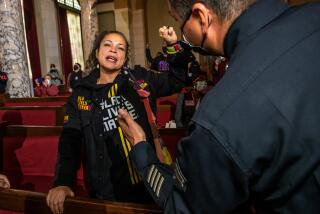Justices Refuse to Swallow Drug Appeal
- Share via
Police are justified in grabbing a suspect by the throat to prevent the swallowing of drugs that may be needed as evidence, an appellate court in Santa Ana ruled Monday.
That ruling came in an appeal of a Huntington Beach drug arrest case that pitted the Police Department’s need to recover evidence against the defendant’s right against unreasonable and excessive force in his arrest.
In its ruling Monday, the 4th District Court of Appeal in Santa Ana upheld the drug conviction of Richard J. Cappellia of Santa Ana, who was convicted in 1986 of trying to sell heroin to an undercover police officer.
Cappellia, suspected of selling drugs from a Huntington Beach barbershop, was arrested in Santa Ana on Dec. 19, 1985--but only after police grabbed him by the throat, wrestled with him on the ground and got him to spit out two bindles of heroin.
Earlier, the suspect had agreed to sell the drug to undercover Huntington Beach Police Lt. Patrick Gildea, who was posing as a drug buyer. The two went to Cappellia’s Santa Ana home, where Gildea was to inject heroin himself to prove to the dubious Cappellia that he was not a cop.
But as they approached the house, Gildea suddenly identified himself as a police officer, prompting Cappellia to try to flee. Gildea testified that he and another officer on the scene grabbed him by the neck “to keep his Adam’s apple from going down,” so the suspected drug dealer could not swallow packets of heroin already in his mouth.
Cappellia appealed his conviction, in part contending that the drug evidence should have been suppressed at his trial because police were unjustified in choking him.
In its ruling, however, the appellate court said police “only used that force necessary to prevent defendant from swallowing the drug,” a force that is justified under the law.
Citing previous state appellate rulings, justices held that police cannot choke a suspect to get him to spit out drug evidence but can grab the suspect’s throat to prevent him from swallowing.
Police had good reason to believe Cappellia would swallow the drugs and, in grabbing him by the throat to try to search his mouth, did not violate his “personal privacy and security” or threaten his safety, the court found.
Justice Edward J. Wallin, concurring “very reluctantly” in the court’s decision, said in a separate opinion that the distinction between choking a suspect and applying minimal force to the throat is a meaningless one that relies on “Orwellian newspeak.”
The state attorney general and appellate justices “should call a spade a spade,” Wallin wrote. “I invite my colleagues . . . to try swallowing an object while someone pressures the neck enough to prevent it. The swallowing reflex is a powerful one, and the considerable force required to thwart it can only be called ‘choking’ by any forthright observer.”
More to Read
Sign up for Essential California
The most important California stories and recommendations in your inbox every morning.
You may occasionally receive promotional content from the Los Angeles Times.













